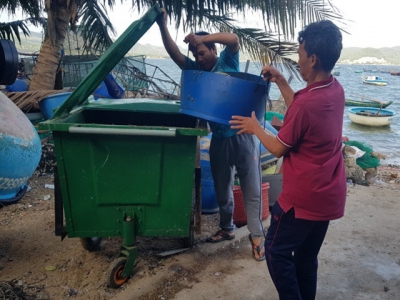Waste collection in aquaculture is urgent to conserve aquatic resources

The collection of waste in aquaculture is very necessary and urgent in order to gradually improve the environment in the farming area and conserve the aquatic resources.
People collect waste in aquaculture in Xuan Yen Ward, Song Cau Town, Phu Yen Province. Photo: Dong Thai.
Xuan Dai bay, which is located in Song Cau Town, Phu Yen Province, has a total area of about 130.45sq.km with large, airy, airtight water surface and stable water environment. Therefore, it is convenient for cage aquaculture development such as lobster and sea fish with the output of 400-450 tons per year.
In addition to the achieved results, environmental pollution in aquaculture areas is increasingly serious, disease situation is complicated, dairy disease on lobster still occurs in many farming areas. Due to the environmental problem in May and June 2017 in Xuan Yen Ward and Xuan Phuong Commune, Song Cau Town, there were 1,636,654 lobsters of 693 farming households died.
The causes of mass mortality of lobsters included high raising density, cages placed close to the bottom, closed cages, cages with small size, prolonged hot weather (high water temperature) leading to strong decay and mineralisation of organic substances accumulated in the bottom of the raising area for a long time.
Besides, the accumulation of organic substances from the redundant food during feeding in the bed of raising area caused the lack of oxygen in the bottom, leading to mass death of lobsters.
In the process of cage aquaculture, the amount of waste from aquaculture activities is quite large including packages for food, medicine, biological products and shells. People often leave waste directly into the environment. If it isn’t collected and processed timely, it will cause environmental pollution in Xuan Dai bay.
With favourable conditions of solid waste collection infrastructure and concerns about waste from aquaculture, the Phu Yen Province’s Department of Natural Resources and Environment has chosen Xuan Yen Ward to hold a pilot project of collecting of waste in aquaculture in the ward from November, 2019 to the end of 2020 in the spirit of the State and the people together taking part.
The provincial Department of Natural Resources and Environment supported the People's Committee of Xuan Yen Ward with 12 handcarts placed at gathering points under the coast so that people could easily bring waste from the raft to the right location.
The project has distributed 387 waste baskets to aquaculture households so that they could bring waste from the raft to the shore. Farming households with more than 30 cages will pay a service fee of VND 70,000 (US$ 2,9) per household monthly and less than 30 cages will pay a service fee of VND 50,000 ($2,1).
The Xuan Yen Ward’s People's Committee has also issued notices, printed and distributed leaflets, propagated and mobilised aquaculture households about the location, time and price of aquaculture waste collection services for them to know and bring waste to the shore at the right location and time for the transfer team to collect.
During the implementation, the town People's Committee provided its expenditure for rubbish collection activities in the first two months of implementation without collecting service fees of households. In addition, there were also many beach clean-ups in Phuoc Ly street, which is a key area for cage shrimp farming.
In the early days, the volume of waste brought to shore by aquaculture households for processing was still small. It was about 2m3 to 3m3 every collection. From the beginning of 2020 to September 2020, the average volume of waste was about 6m3 per one collection. It was higher than the expected plan. People collected three times a week on Mondays, Wednesdays and Fridays.
The project has helped to reduce waste in Xuan Dai bay, protecting the environment and creating habits, raising awareness about waste collection in aquaculture.
However, this model ended from 2020 and it is no longer being implemented this year because the fund collected from the people isn’t enough to pay for the waste collectors; price of lobsters is low due to the COVID-19 epidemic so many people don’t raise any more.
In the Law on Environmental Protection 2020 (effective from January 1, 2022), Clause 3, Article 61 stipulates veterinary drugs, aquatic feeds, aquaculture environment treatment products, mud and accumulated food must be cleaned under regulations on waste management. Meanwhile, Clause 2, Article 73 says that plastic waste generated from aquaculture activities must be collected, stored and transferred to establishments with recycling and processing functions.
Consequently, it is very necessary and mandatory to collect waste from cage aquaculture as well as continuing to deploy and develop the waste collection models from aquaculture. However, it is necessary to have policies and mechanisms in order to the waste collection from aquaculture can be carried out regularly and continuously.
Có thể bạn quan tâm
 Hi-tech shrimp farming booms in Quang Ninh
Hi-tech shrimp farming booms in Quang Ninh Households in the northern province of Quang Ninh province have applied high technologies in their shrimp farming, earning billions of dong each year.
 Farming of all-male blue-legged prawns proves high economic value
Farming of all-male blue-legged prawns proves high economic value The model of all-male blue-legged prawns farming combined with fish breeding and coconut planting, has adapted well to climate change
 Environmental pollution of offshore fish farms in urgent need of handling
Environmental pollution of offshore fish farms in urgent need of handling Many fish farmers in Binh Dinh Province have been concerned about the issue of the environment in their offshore fish farms to prevent diseases